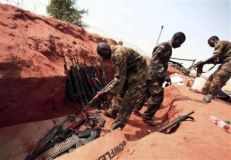Security Council fails to condemn attack on AU in Darfur
October 1, 2007 (UNITED NATIONS) — The U.N. Security Council failed to issue a formal statement on Monday condemning a rebel attack on an African peacekeeping base in Darfur over the weekend because of a dispute over naming the culprits.
 The council’s president put off until Tuesday an official statement, which must be approved by all 15 member nations, though he did condemn the assault in comments to the press.
The council’s president put off until Tuesday an official statement, which must be approved by all 15 member nations, though he did condemn the assault in comments to the press.
“We could not agree on the language,” said the current council president, Ghanaian Ambassador Leslie Kojo Christian.
In the interim he said, “the recent attack on AU peacekeepers in South Darfur was condemned (by all council members) and there was a demand that no effort should be spared that the perpetrators be brought to justice.”
The AU says 20 of its soldiers were killed or hurt and nine are missing after the attack, which was blamed on rebel factions. It was the worst assault on AU forces since 2004 when the 7,000-strong mission was deployed to western Sudan.
At issue in the Security Council was a pending investigation by the AU on identifying the culprits, which U.S. Ambassador Zalmay Khalilzad said was not yet complete.
South Africa’s Ambassador, Dumisani Kumalo, said many members wanted a reference in the statement to a “terrorist attack” on the AU base at Haskanita in southern Sudan because every report received so far indicated it was done by rebels.
Diplomats said Russia and Qatar agreed with South Africa.
Sudan’s U.N. Ambassador Abdalmahmood Abdalhaleem Mohamad said if his government had been involved, the council would have been quick to condemn it. He said that both the AU and Sudan had identified elements of the rebel Justice and Equality Movement and the Sudan Liberation Army as the culprits.
“This is a very ugly action by the rebel groups,” aimed at wrecking peace talks scheduled next week in Tripoli, Libya, the ambassador said.
Khalizad suggested the council should impose sanctions or take other steps to punish the perpetrators once investigations were complete.
He and other council members said the attack showed the need for the planned African Union-United Nations force of up to 26,000 troops and police to be deployed quickly.
“It underscores that the force needs capabilities,” he said, stressing that while a joint force would have an “African character” it had to recruit contingents with special skills.
The United Nations and the AU have been in dispute over the composition of the force, with the AU backing Sudan in wanting all African troops. A unit of Norwegian engineers has been rejected by Khartoum, U.N. sources said.
But the attack is bound to have an impact on troop contributors. Senegalese President Abdoulaye Wade has already warned he would pull out his soldiers if it is determined that the targeted peacekeepers were not equipped to defend themselves.
The AU has long complained of a lack of equipment in Darfur, including attack helicopters and rapid response vehicles. They have also said their force was too small to contain the conflict in the vast region the size of France.
(Reuters)
